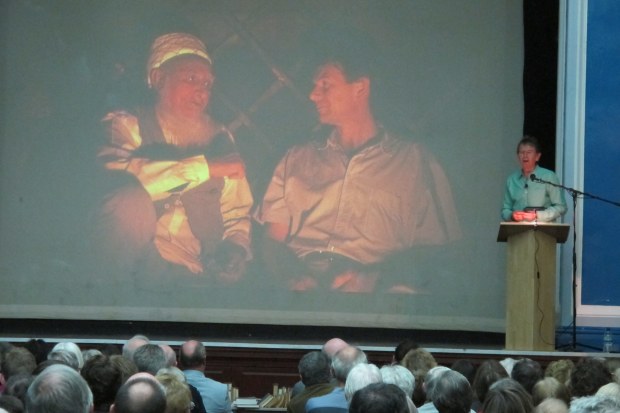These words of wisdom offer advice to any aspiring historian hoping to accurately relate the events of the past, and one man who has quite literally walked the history that he relates is the acclaimed broadcaster, historian, author and filmmaker Dr Michael Wood. Drawing on an extraordinary wealth of personal experience and an infectious enthusiasm for discovering cultures, both ancient and modern, Dr Wood took a record-breaking audience of 302 members and visitors of the Lytham St Annes CA on a fascinating journey to retrace the steps of Alexander the Great.
It is easy when envisaging the hardship, the glory, the scale and the excitement of a march which extended beyond the boundaries of the then-known world to India and Tajikistan, to let our imaginations run away with us. But by sets of photographs and anecdotes recounting the trek, Michael proved that our wildest visions are often correct – the landscape is indeed incredible and appeared to him almost as it would have done to an army of 40,000 men and 15,000 cavalry as they crossed mountains and bridged fords, weaving their path through foreign lands and enemy realms. Michael brought the realities of the march to life, as he and his film crew spent days trekking through the desert miles away from civilisation, sleeping rough on the top of ruined roofs, suffering from illness, accompanied by bandits and guides armed with menacing shotguns and a couple of camels in place of their trusty landrover, and then an ex-Soviet ambulance!

Many of us have heard about the famous oracle of Zeus Ammon which Alexander (and Michael, too) visited and received assertions of his heroic lineage and his imminent success but we were also treated to a ground breaking discovery about the actual site of the battle of Gaugamela, which was made by a close study of the ancient sources, lots of geographical precision, a bit of luck and, most importantly, a hands-on approach. We were also taken through the Hindu kush, to the tomb of kings and the Apadana at the Persian administrative capital of Persepolis, and scores of remains in Iraq, Iran and Syria which are of course no longer accessible to archaeologists.

Alexander has been portrayed in turn as a megalomaniac, a hero and a manic depressive who may even have been poisoned to death (it sounds like the plot of a Hollywood movie, and Michael’s wonderful anecdote of talking to Oliver Stone’s ‘man’ on this very subject was one of the many highlights of the evening!) – but no matter which interpretation we believe, he had incredible strength and determination, suffering at least twenty major wounds over the course of the journey whilst preventing major mutiny and succeeding in killing the great Persian king Darios III. The distance his army travelled, the battles they fought and won, and the legacy they left behind is testament to Alexander’s persuasive and strategic powers as a military general and a leader of men. Legends retain their power: older men, like one particular bard in Tehran Michael was entertained by, echo the oral poetic tradition of antiquity by reciting the tales of Alexander when he entered Asia and some regional groups still claim lineage from Alexander’s troops.

Michael’s knowledge is inexhaustible and we could have continued listening to him for many hours, but, after a very warm and heartfelt vote of thanks by member and local historian Peter Shakeshaft, we all showed our appreciation for an extremely powerful and evocative talk. Thanks as ever to AKS Lytham and all our fantastic volunteers for their excellent organisation on such a busy night.
We look forward to Dr Gail Trimble’s lecture on March 16th and then the grand final of the 2017 Classics Competition, judged by Katherine Backler, on March 23rd. Here’s to further great events next month!
©Katrina Kelly









You must be logged in to post a comment.